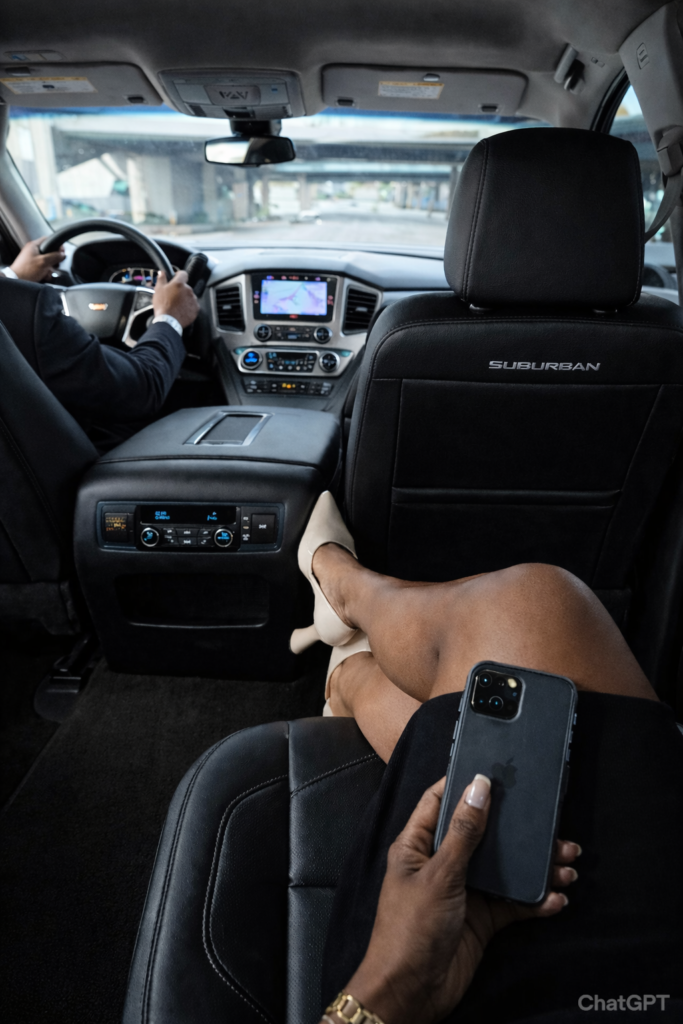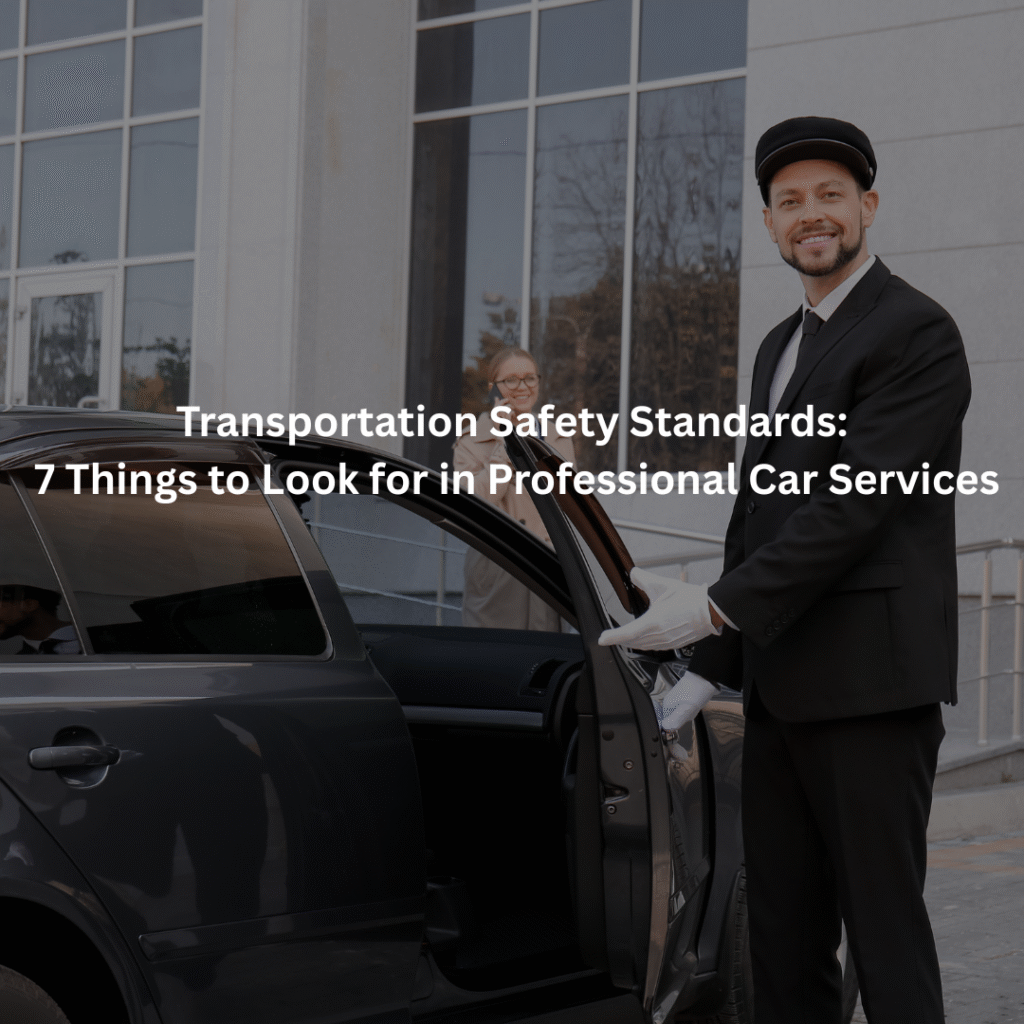
Imagine stepping into a vehicle where every detail has been meticulously planned for your safety from the extensively trained chauffeur behind the wheel to the comprehensive insurance coverage protecting your journey. This level of security isn’t accidental; it’s the result of rigorous safety standards that distinguish legitimate Professional Car Services from casual transportation options that may put your wellbeing at risk.
Professional Car Services have evolved into sophisticated operations that prioritize passenger safety through multi-layered protocols, advanced technology, and stringent operational standards. These companies understand that true luxury isn’t just about comfortable seating and premium amenities it’s about the peace of mind that comes from knowing every aspect of your transportation has been designed with safety as the primary consideration.
In today’s transportation landscape, the differences between Professional Car Services and alternative options have never been more pronounced. While rideshare apps and unlicensed operators may offer convenient booking and competitive pricing, they often lack the comprehensive safety frameworks that professional operations implement as standard practice. Understanding what to look for in Professional Car Services can mean the difference between a secure, worry-free journey and a potentially dangerous situation that compromises your safety and security.
The Department of Transportation has implemented increasingly stringent safety regulations for commercial transportation providers, creating clear distinctions between operators who meet professional standards and those who cut corners on safety protocols.
1. Comprehensive Driver Screening and Qualification Standards
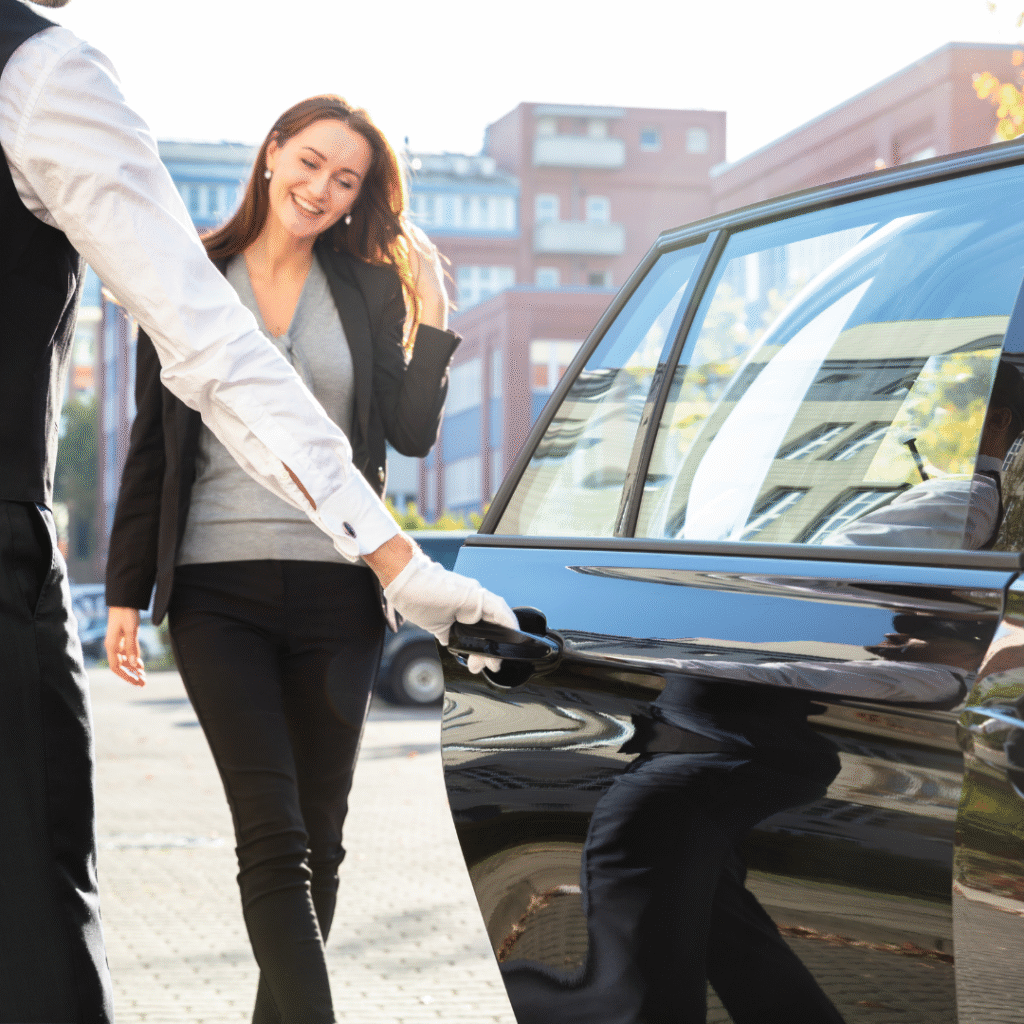
The foundation of safe Professional Car Services lies in rigorous driver selection processes that go far beyond basic requirements. Professional operators implement multi-stage screening procedures that examine every aspect of a potential driver’s background, qualifications, and character before allowing them to transport passengers.
Criminal background checks conducted by reputable executive black car service providers extend beyond simple local screenings to include federal databases, multi-state criminal history searches, and specialized databases that track transportation-related violations. These comprehensive checks often reveal issues that limited screening might miss, including out-of-state violations or federal infractions.
Professional Car Services require specialized licensing that demonstrates competency beyond standard driver’s licenses. Commercial driver’s licenses, chauffeur permits, and professional driving certifications involve additional testing, training, and ongoing education requirements that ensure drivers possess the skills necessary for safe commercial transportation.
Drug and alcohol screening programs in Professional Car Services typically exceed Department of Transportation requirements, including pre-employment testing, random screening throughout employment, and immediate post-incident testing procedures. The most professional operations maintain zero-tolerance policies and comprehensive substance abuse programs.
Driving record analysis extends beyond recent violations to examine long-term patterns of behavior, accident history, and traffic law compliance. Professional Car Services often maintain stricter standards than regulatory minimums, disqualifying candidates with violations that might be acceptable for other types of employment.
Medical qualification requirements ensure drivers can safely operate vehicles under various conditions and assist passengers when necessary. These examinations often include vision testing, physical capability assessments, and evaluations of conditions that might affect safe driving performance.
The best chauffeured transportation services maintain ongoing monitoring programs that track driver performance, customer feedback, and compliance with safety protocols throughout employment. This continuous oversight ensures that safety standards are maintained and identifies potential issues before they become safety problems.
2. Advanced Vehicle Safety Standards and Maintenance Protocols

Professional Car Services distinguish themselves through comprehensive vehicle safety programs that extend far beyond basic roadworthiness requirements. These programs address every aspect of vehicle operation, from preventive maintenance schedules to emergency equipment and safety technology integration.
Regular safety inspections in professional operations occur more frequently than state requirements mandate, often involving weekly safety checks and comprehensive monthly examinations. These inspections cover critical safety systems including brakes, steering, tires, lights, and emergency equipment, ensuring that potential issues are identified and addressed before they compromise safety.
Preventive maintenance programs implemented by luxury car service Philadelphia providers follow manufacturer specifications while often exceeding recommended service intervals to ensure optimal vehicle performance. These programs include regular fluid changes, brake system maintenance, tire rotation and replacement, and comprehensive mechanical inspections.
Fleet age management represents another crucial aspect of professional vehicle safety standards. While personal vehicles might operate safely for decades, Professional Car Services typically maintain age limits on their fleet vehicles to ensure that safety systems remain current and reliable. This approach ensures passengers benefit from the latest safety technologies and most reliable mechanical systems.
Vehicle modification and safety upgrades often distinguish professional operations from standard vehicle services. These modifications might include enhanced lighting systems, improved communication equipment, specialized passenger safety features, or additional emergency equipment that exceeds standard vehicle specifications.
Real-time vehicle monitoring systems utilized by modern Professional Car Services track mechanical performance, driver behavior, and maintenance needs continuously. These telematics systems can identify potential safety issues before they become dangerous situations, alerting dispatchers to problems like brake wear, engine issues, or unsafe driving behaviors.
Emergency equipment requirements in professional vehicles go beyond basic safety gear to include specialized equipment for passenger assistance, emergency communication, and incident response. Professional vehicles typically carry first aid supplies, emergency communication devices, fire suppression equipment, and tools necessary for roadside emergency response.
3. Comprehensive Insurance Coverage and Liability Protection

Insurance requirements for Professional Car Services significantly exceed those for personal vehicles, providing multiple layers of protection that address the unique risks associated with commercial passenger transportation. Understanding these coverage requirements helps identify legitimate professional operations and avoid inadequately protected transportation providers.
Commercial auto liability coverage for Professional Car Services typically includes much higher limits than personal auto policies, often ranging from $1 million to $5 million or more per incident. This enhanced coverage protects passengers from financial exposure in case of accidents while ensuring that the transportation provider can meet financial obligations related to injury or property damage claims.
Professional liability insurance addresses risks specific to passenger transportation services, including coverage for injuries that occur during boarding or alighting, property damage to passenger belongings, and business interruption situations. This specialized coverage handles scenarios that standard auto insurance doesn’t typically address.
Passenger accident insurance provides additional protection specifically for injuries that occur during transportation, regardless of fault determination. This coverage ensures that passengers receive immediate medical attention and compensation without waiting for liability determinations or legal proceedings.
Corporate black car service providers often maintain umbrella policies that provide additional coverage beyond basic commercial limits. These policies demonstrate comprehensive risk management approaches and provide extra assurance for high-value corporate accounts or specialized transportation services.
Workers’ compensation coverage protects drivers while ensuring that work-related injuries don’t create liability issues for passengers. This coverage also demonstrates professional employment practices and commitment to driver welfare that characterizes legitimate business operations.
Garage liability coverage addresses risks associated with vehicle storage, maintenance, and operational facilities. This coverage protects against property damage or injuries that might occur at business facilities and demonstrates comprehensive risk management practices.
4. Regulatory Compliance and Professional Licensing
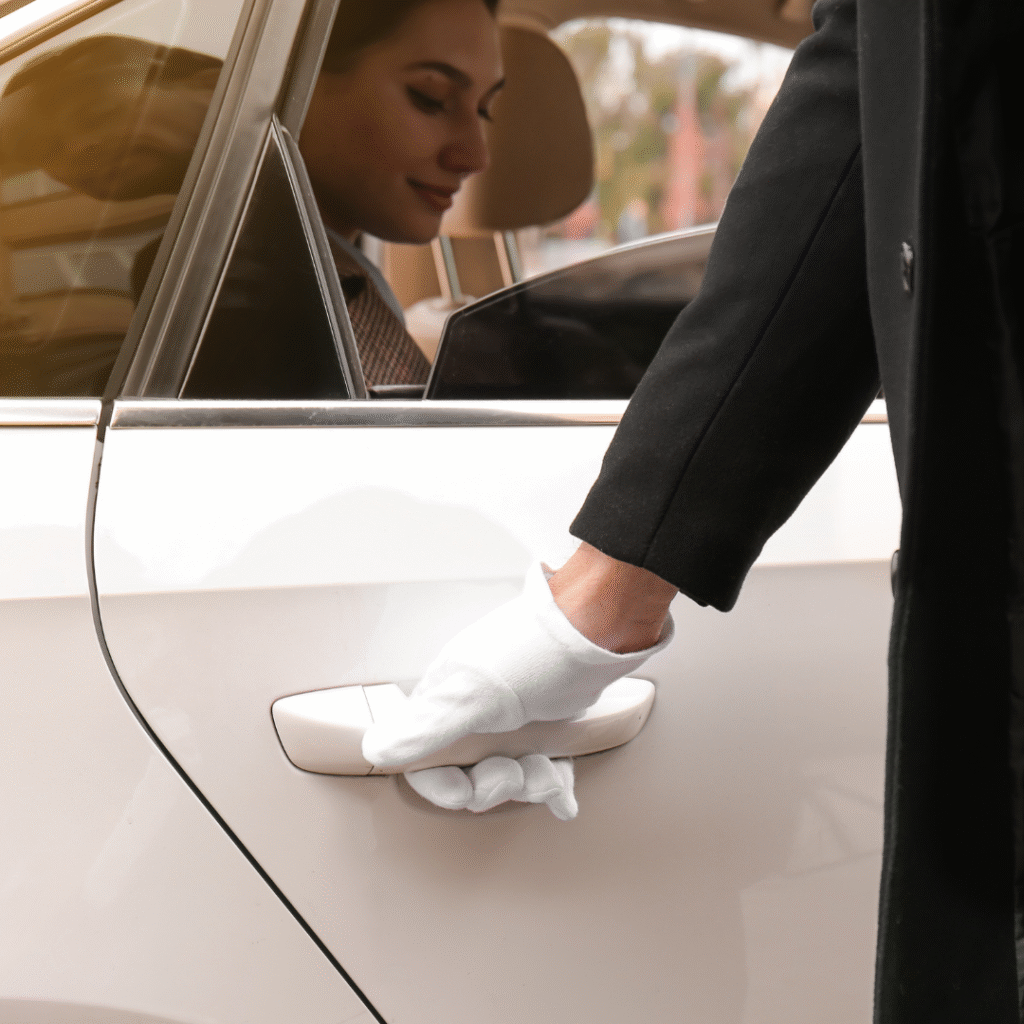
Professional Car Services operate within complex regulatory frameworks that vary by jurisdiction and service type. Compliance with these regulations demonstrates legitimacy and ensures that operators meet established safety and operational standards.
Federal licensing requirements apply to many Professional Car Services, particularly those involved in interstate transportation or airport operations. The Federal Motor Carrier Safety Administration establishes safety standards, operational requirements, and compliance procedures that legitimate operators must follow.
State licensing and registration requirements typically include business registration, vehicle inspections, insurance verification, and operational permits. Many states maintain online databases where consumers can verify the licensing status and compliance history of Professional Car Services before booking transportation.
Local operating permits represent another layer of regulatory compliance that Professional Car Services must maintain. These permits often involve additional safety requirements, insurance verification, and operational standards specific to local jurisdictions.
Airport operating authorities require specialized permits and enhanced security screening for Professional Car Services serving commercial airports. These permits involve federal background checks, insurance verification, and compliance with aviation security regulations that demonstrate enhanced safety and security standards.
Industry association memberships and certifications provide additional verification of professional standards and commitment to ongoing education and improvement. Organizations like the National Limousine Association establish industry standards and provide resources for professional development and safety enhancement.
Public Utilities Commission oversight in many states provides additional regulatory supervision and consumer protection for Professional Car Services. This oversight includes rate regulation, service standards, and complaint resolution procedures that protect consumers and ensure professional operation.
5. Emergency Response Procedures and Crisis Management
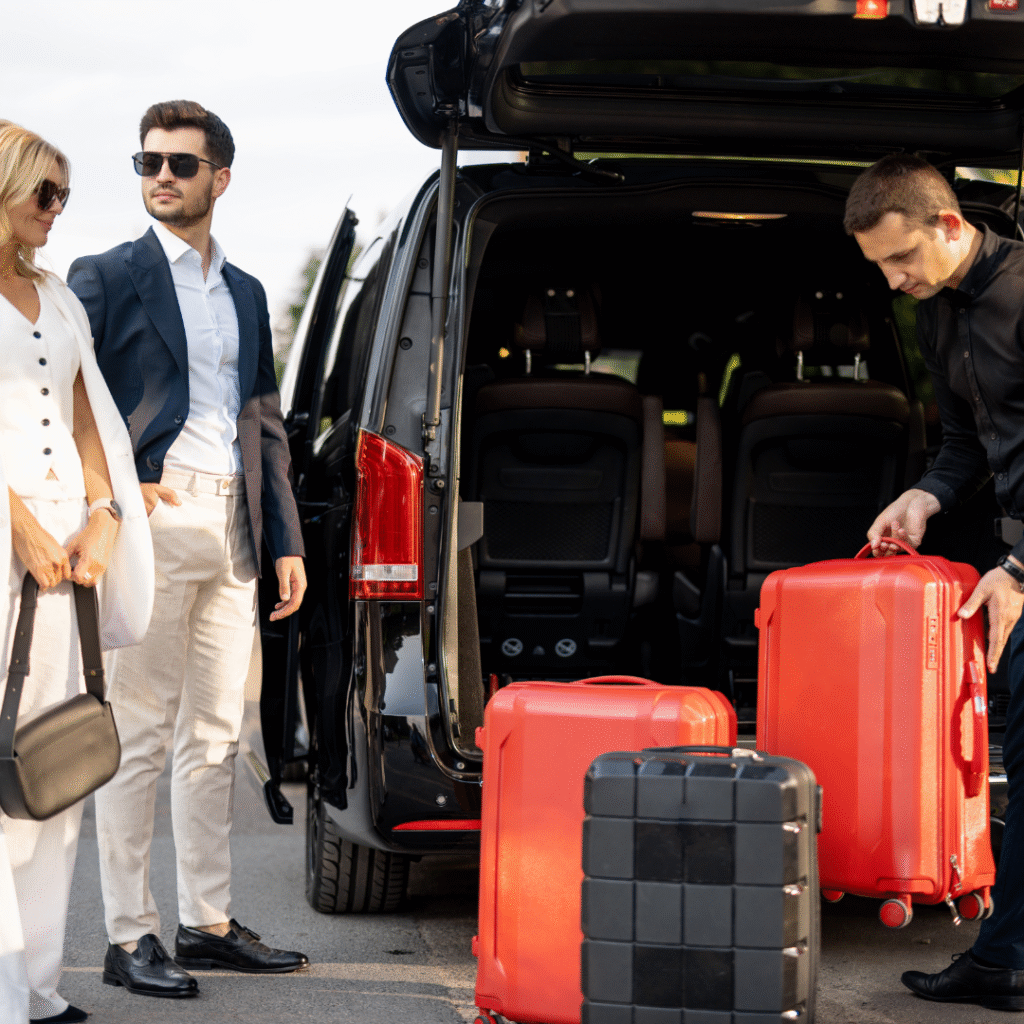
Professional Car Services distinguish themselves through comprehensive emergency response protocols that address various scenarios from mechanical breakdowns to medical emergencies and security situations. These protocols ensure passenger safety while maintaining service continuity even during challenging circumstances.
Driver emergency training programs cover first aid procedures, emergency communication protocols, and coordination with emergency services. Professional drivers learn to assess situations quickly and take appropriate action to protect passenger safety while securing professional assistance when needed.
Communication systems in Professional Car Services ensure constant contact between drivers and dispatch centers, enabling immediate response to emergency situations. These systems often include GPS tracking, panic buttons, emergency communication devices, and direct links to emergency services.
Vehicle breakdown procedures ensure passenger safety and service continuity when mechanical issues occur. Professional operations maintain backup vehicle protocols, emergency roadside assistance programs, and passenger transfer procedures that minimize inconvenience while maintaining safety standards.
Medical emergency response procedures ensure appropriate action when passengers experience health issues during transportation. Worldwide chauffeur services train drivers in basic first aid, emergency medical response, and coordination with emergency medical services to ensure rapid, appropriate response to medical situations.
Security incident protocols address potential safety threats or unusual situations that might arise during transportation. These protocols include communication procedures, passenger protection strategies, and coordination with law enforcement when necessary.
Weather emergency procedures ensure safe operation during challenging weather conditions. Professional Car Services maintain protocols for severe weather events, including alternative routing, service suspension criteria, and passenger communication procedures that prioritize safety over service convenience.
6. Technology Integration for Enhanced Safety and Security

Modern Professional Car Services utilize advanced technology systems that enhance safety through real-time monitoring, predictive maintenance, improved communication, and comprehensive incident documentation. These technological capabilities provide safety advantages that traditional transportation methods cannot match.
GPS tracking and fleet management systems provide multiple safety benefits including route optimization, driver behavior monitoring, emergency location services, and real-time communication capabilities. These systems allow dispatchers to monitor vehicle locations, track progress, and respond quickly to any unusual situations or emergency requests.
Driver behavior monitoring technology tracks critical safety factors including speed, acceleration, braking patterns, adherence to traffic laws, and compliance with route instructions. This data helps Professional Car Services identify safety issues, provide additional training when necessary, and maintain consistent safety standards across their driver workforce.
Vehicle diagnostic and maintenance monitoring systems track mechanical performance and alert operators to potential safety issues before they become dangerous situations. These systems monitor critical components including brakes, engines, tires, and other safety systems, enabling proactive maintenance that prevents breakdowns and ensures optimal safety performance.
Mobile applications utilized by reputable 5 star rated limousine service providers often include safety features such as real-time tracking, driver information sharing, emergency contact capabilities, and direct communication with dispatch centers. These features provide passengers with additional security and peace of mind during transportation.
Dash camera and incident recording systems provide objective documentation of driving conditions, incidents, and passenger interactions. This technology protects both passengers and drivers while providing valuable data for safety analysis, training improvement, and incident investigation.
Communication and dispatch systems ensure reliable contact between drivers, dispatchers, and passengers throughout the transportation process. Advanced systems include backup communication methods, emergency protocols, and integration with emergency services that enhance safety and security capabilities.
7. Transparent Safety Records and Performance Documentation

Professional Car Services demonstrate their commitment to safety through transparent documentation of their safety records, compliance history, and performance metrics. This transparency allows potential customers to make informed decisions based on actual safety performance rather than marketing claims.
Safety statistics and performance metrics maintained by professional operations typically include accident rates, safety incident reports, driver performance records, and compliance audit results. Reputable best chauffeured transportation services willingly share this information with potential customers and regulatory authorities.
Insurance claims history and loss experience provide objective measures of safety performance over time. Professional Car Services with strong safety records typically maintain low insurance claims rates and positive relationships with insurance providers who recognize their commitment to risk management.
Regulatory compliance records demonstrate consistent adherence to safety standards and professional operational requirements. These records include inspection results, violation history, corrective action documentation, and compliance audit outcomes that verify professional operation.
Customer safety feedback and satisfaction surveys provide real-world perspectives on safety performance and professional service delivery. Professional Car Services actively collect and respond to customer feedback regarding safety concerns, driver performance, and service quality issues.
Industry certification and recognition programs provide third-party verification of safety standards and professional operation. Certifications from industry associations, safety organizations, and regulatory authorities demonstrate commitment to excellence and ongoing improvement in safety performance.
Third-party safety audits and assessments conducted by independent organizations provide objective evaluation of safety standards, operational procedures, and risk management practices. These audits help identify improvement opportunities and verify compliance with industry best practices.
Red Flags: Warning Signs to Avoid
Understanding warning signs of inadequate Professional Car Services helps consumers avoid potentially unsafe transportation situations and identify operators who may not maintain appropriate safety standards.
Lack of proper licensing or inability to provide verification of permits, insurance coverage, and regulatory compliance represents a major red flag. Legitimate Professional Car Services readily provide proof of licensing, insurance certificates, and regulatory compliance documentation.
Extremely low pricing compared to other Professional Car Services often indicates corner-cutting on safety standards, insurance coverage, driver qualification requirements, or vehicle maintenance standards. While competitive pricing is normal, prices significantly below market rates may indicate inadequate safety investments.
Poor vehicle condition, including visible mechanical issues, cleanliness problems, outdated safety equipment, or obvious maintenance neglect suggests broader problems with safety standards and professional operation that should raise immediate concerns.
Driver qualification issues such as inability to provide proper identification, lack of commercial licensing, unprofessional behavior, or obvious unfamiliarity with safety procedures indicate inadequate screening and training standards.
Limited or no insurance coverage, inability to provide insurance certificates, or coverage limits significantly below industry standards expose passengers to unnecessary financial and safety risks that professional operations would never allow.
Lack of emergency procedures, inability to explain safety protocols, or absence of emergency equipment and communication capabilities suggests inadequate preparation for safety-critical situations that could arise during transportation.
Making Informed Safety-Conscious Transportation Decisions
When selecting Professional Car Services, prioritize safety considerations alongside convenience, pricing, and service factors. The security and peace of mind provided by comprehensive safety standards far outweigh minor cost savings from less professional alternatives.
Research potential providers thoroughly, including verification of licensing, insurance coverage, safety records, and industry certifications. Legitimate premium car service providers welcome such inquiries and readily provide documentation of their safety credentials and performance history.
Ask specific questions about safety protocols, driver qualifications, emergency procedures, and insurance coverage during the booking process. Professional Car Services should be able to clearly explain their safety standards and provide detailed information about their operational procedures.
Read customer reviews and testimonials with particular attention to safety-related feedback, emergency situation handling, and overall service reliability. This information provides valuable insights into how Professional Car Services perform under various conditions and challenging situations.
Verify that chosen providers can meet any specific safety requirements or compliance standards that your organization or situation might require. Corporate accounts, special events, or high-security situations may require enhanced safety protocols that not all providers can accommodate.
Consider the provider’s fleet age, maintenance standards, technology integration, and safety equipment when making selection decisions. Modern vehicles with current safety systems, professional maintenance, and advanced safety technology provide better protection than older or inadequately equipped alternatives.
Ready to experience transportation services that never compromise on safety? Contact Delux Limousine Transportation Services.
- Call: 610-871-8784
- WhatsApp: 267-988-3392
- Email: reservations@dltsl.com
to discuss your safety-conscious transportation needs. Visit our services page to learn about our comprehensive safety protocols and professional standards, or connect with us on Facebook to see our commitment to passenger safety in action. Reach out through our contact page to schedule transportation with a company that puts your safety first, always.


